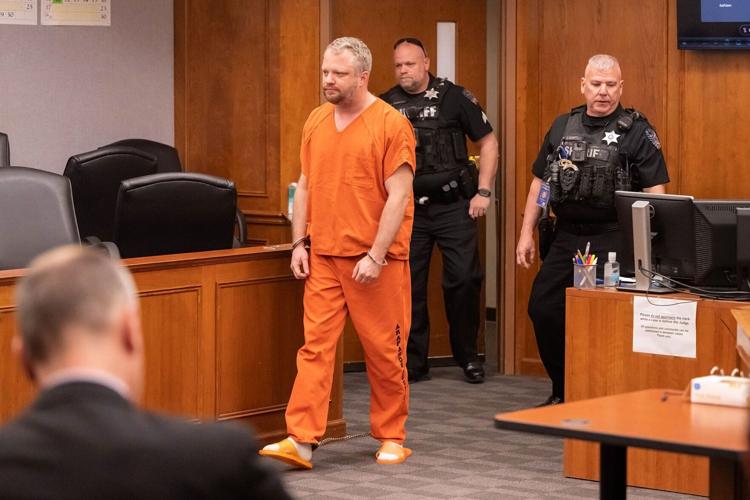Defense attorneys want key evidence tossed in murder trial of Aurora dentist
Less than three months before the start of a first-degree murder trial of an Aurora dentist accused of poisoning his wife, an Arapahoe County district judge is deciding whether or not to admit some key evidence in the case.
On Tuesday, James Craig’s attorneys argued to suppress Google searches found on the dentist’s work computer for several poisons and whether or not they were detectable. Those queries were discovered by detectives through searching the hard drive of an office computer but made from an account called jimandwaffles@gmail.com. The account was a new one, created on Feb. 27, three weeks before Angela Craig died.
The searches included “how many grams of pure arsenic would kill a human” and “Is Arsenic Detectible in an Autopsy?”
During their search, detectives also played a YouTube video accessed through jimandwaffles@gmail.com which showed The top 5 undetectable poisons showing no signs of foul play, according to the arrest affidavit.
Some of these searches, the defense said, were discovered illegally by investigators whom they contend went “beyond the scope” of what they asked for in the search warrant.
But Deputy District Attorney Michael Mauro called that defense a “strawman argument,” contending that Craig’s attorneys were using “hypertechnical construction of the language in the warrant.” He argued that the search complied with the warrant.
March 6, 2023
Prosecutors say that some the searches were originally done on a computer in a back room, based on an eyewitness who said she saw Craig using it after-hours.
Sunnybrook Dental Group’s office manager, Caitlyn Romero, told police that she saw Craig in a dark back examination room “doing something” on computer #9 March 6, “the day Angela became sick,” which she said was “odd,” according to the arrest warrant. Thirty minutes after he left, she said that Craig texted her and asked her not to open a personal package which would be delivered to the office.
March 13, the package arrived and was and opened by an employee despite Craig’s direction that the parcel remain intact. In the package was a cylinder labeled Potassium Cyanide.
Angela Craig was rushed to two hospitals three times over a period of 11 days starting March 6, 2023. On the first visit, she was released from Parker Adventist Hospital after complaining of dizziness and weakness. Three days later, March 9, she was again admitted to to Parker Adventist, but this time she was much sicker and stayed for five days.
During that time, Craig was corresponding with an orthodontist whom he had met at a conference.
March 15, Angela Craig was admitted to University Hospital in “grave condition,” the affidavit said. That day, detectives seized the hard drive from computer #9.
Mrs. Craig, 43, was taken off of life support at University Hospital on March 18, 2023.
Defense attorney Andrew Ho claimed that searches detectives made were unconstitutional because the search warrant only asked for information stored in the computer’s hard drive. Yet investigators, he claimed, went further than that — actually searching the internet.
“The 18th Judicial wants to be able to access whatever they want without probable cause,” he said, arguing that “Dr. Craig has a reasonable expectation of privacy.”
But the prosecution said that the warrant did not restrict the search to the hard drive only.
Mauro added that the searches for poisons and their effect on human beings would have eventually been discovered.
In a similar case, the Colorado Supreme Court upheld the fruits of a Denver Police Department search warrant that detectives used to identify the teenagers accused of killing five members of a Senegalese family in 2020 with an intentionally set house fire.
Attorneys for one of the teenagers charged with first-degree murder, sought to have the evidence from a warrant for Google searches of the destroyed home’s address, on North Truckee Street in Green Valley Ranch, excluded from his case. They argued the warrant violated the teen’s protections against unreasonable searches and seizures.
The justices found in a split decision that the evidence uncovered would be admissible in court because police acted on a good-faith belief the warrant was constitutional.
But the court declined to make a broad rule about the constitutionality of reverse-keyword search warrants. The type of warrant uses the term “reverse” because they use potentially incriminating evidence to identify possible suspects, rather than the other way around, as in traditional warrants.
Craig, whose hair appears to have greyed since earlier hearings, listened intently to the proceedings, at times even chuckling at some of the comments made by his attorneys. His ankles were shackled and his hands were cuffed from behind, but he was able to lean over to put on his reading glasses to read paperwork on the desk in front of him.
Friends of Angela Craig were in the courtroom to watch the hearing, which took up most of the day, but none of the Craig’s six children were present in person.
Her autopsy indicated that she died from lethal doses of cyanide and tetrahydrozoline, which is a decongestant found in over-the-counter eyedrops.
Eighteenth Judicial District Judge Shay Whitaker did not rule on the motion to suppress the searches, but said she would make an order soon.
Craig’s trial is set for April 23, with jury selection starting April 19 and it could last until at least May 7.






